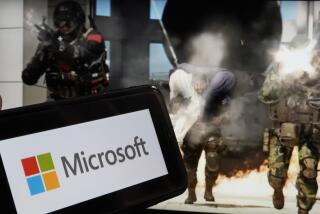Judge Sides With HP on Compaq Deal
- Share via
Hewlett-Packard Co. scored a major victory in its seven-month struggle to acquire Compaq Computer Corp. on Tuesday when a judge ruled that HP did not mislead shareholders or engage in vote buying to win support.
HP’s win was sweetened late Tuesday when Walter Hewlett, who challenged the shareholder vote in Delaware’s Chancery Court, said he won’t appeal the ruling and would drop his challenge of the shareholder vote count.
“After reviewing the court’s opinion, we have decided not to appeal the decision,” Hewlett, son of HP co-founder William Hewlett, said in a statement. “I will ... now do everything possible to support the successful implementation of HP’s acquisition of Compaq and encourage others who have shared my views in the past several months to do the same.”
The court ruling and Hewlett’s capitulation clear the way for the largest high-tech merger in history to close May 7 if the narrow margin of victory to approve the plan is confirmed as expected. HP still faces probes about the shareholder vote from the Securities and Exchange Commission and the U.S. attorney’s office in Manhattan--although experts said the investigations won’t prevent the merger from being consummated.
Hewlett’s case still may have a lasting effect on corporate officers.
“We’re talking about the integrity of the voting process and the role of the dissident director,” said Charles Elson, director of the Center for Corporate Governance at the University of Delaware. “How carefully will the shareholders be listened to? Very carefully in the post-Enron [Corp.] era.”
Hewlett had argued that HP’s top managers lied to shareholders about the likelihood that the $18.5-billion merger would create an efficient tech powerhouse. His legal team introduced a litany of internal reports that painted a bleak picture of the company’s planning process and projections.
Carly Fiorina, HP’s chief executive, countered in court that the reports were misleading “snapshots.” She held to predictions that the merger would meet or exceed optimistic revenue and profit projections touted to shareholders.
Judge William Chandler, who presided over the three-day trial last week, sided firmly with HP. “The public statements made by HP management about the progress of the integration process ... were supported by the facts when they were made and were neither false nor misleading,” he wrote in his ruling.
Hewlett also had accused HP of coercing institutional shareholders, notably Deutsche Bank, with implied threats and the promise of new business. Chandler also rejected that claim. “No one from HP used threats or inducements regarding future business relationships” in a conference call with Deutsche Bank to discuss the proxy vote, the judge wrote.
HP issued a statement saying it “is gratified by the ruling.”
Any relief felt by HP’s managers after the bitter and costly battle may soon dissipate amid the formidable challenge of integrating divergent corporate cultures, slashing jobs and making good on ambitious promises to shareholders.
“No large-scale high-tech merger has ever worked. Everyone will be looking at the Hewlett-Packard-Compaq merger to see if that generalization can be proven wrong,” said David Yoffie, a Harvard University business professor.
Surveys have shown that many employees disagree with the deal. They will be needed to execute an ambitious integration strategy that observers--and as noted in memos released in court, some HP managers--consider unrealistic.
The merger takes place amid a slumping PC market. PC leader Dell Computer Corp. announced plans Tuesday to attack Hewlett-Packard’s PC business as the company struggles to digest Compaq. Meanwhile, information technology spending will remain flat for the rest of the year, analysts said.
In the short run, HP will face massive cost-cutting to improve its competitive posture. The company has announced plans to cut as many as 15,000 employees.
Given the problems of integrating the new firm in a down economy, HP’s sheer size might slow down its creative process.
Historically, HP competed by being the first to market with innovations, but in today’s fast-moving tech industry “prospecting is done primarily by the smaller start-ups,” said Raymond Miles, an emeritus business professor at UC Berkeley. “Becoming a far bigger, and inevitably a far more bureaucratic, organization was really the only strategy that was available to HP.”
Shares of Palo Alto-based HP rose 13 cents to $17.10 before release of the judge’s decision, then eased to $17 in after-hours trading. Shares of Houston-based Compaq fell 15 cents to $10.15, then rose to $10.56 after-hours. Both trade on the New York Stock Exchange.
*
Reuters was used in compiling this report.






